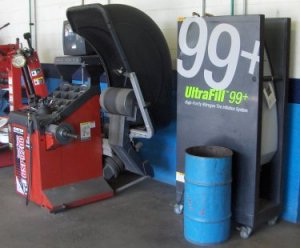
مهندسی دالوند Dalvand Engineering
وبلاگ فنی و تخصصی ماشین آلات سنگین Machinery Technics & Diesel Expert
مهندسی دالوند Dalvand Engineering
وبلاگ فنی و تخصصی ماشین آلات سنگین Machinery Technics & Diesel Expertآیا شارژ نیتروژن در لاستیک بهتراز هواست
Nitrogen: A Noble Gas?
As you can see, there are days when you just have to get your car off the ground and this was one of those days as the Altima was due for a tire rotation. My buddies up at Tire Town have taught me well and I religiously rotate my tires every 6000 miles, no longer than that, and it really seems to have worked as I'm usually getting in the neighborhood of 45,000 miles out of a set of tires.
We put a lot of miles on our vehicles. The 2001 Altima currently has 135,000 miles on it so preventive maintenance is something I believe in.
This year there's a new addition to the equipment in the garage and they have
installed a system for filling tires with nitrogen. It's a clever machine in
that it filters the air to collect the nitrogen it uses, so there are no
compressed gas cylinders to be delivered or tanks to have filled up. Nitrogen
makes up about 78.1% of the atmoshphere by volume, so there's plenty of it to
go around. One of the reasons they installed the system was because of the
consumer interest that was generated by the claims being made about using
nitrogen in your tires.
According to the
"Nitrogen in tires is
becoming a popular replacement for standard air. Nitrogen is all around us...
the air we breathe is 78% nitrogen, 21% oxygen and the rest is small amounts of
other gasses. When it comes to tire inflation, nitrogen has many advantages
over oxygen. With nitrogen tire inflation, improvements can be noted in a
vehicle's handling, fuel efficiency and tire life through better tire pressure
retention, improved fuel economy and cooler running tire temperatures"
Now the first thing I note in that quote is "nitrogen
has many advantages over oxygen". That is no doubt true, but
the nitrogen is being used in place of air, not oxygen. But semantics aside, we
decided to conduct a long term test of nitrogen inflation using my vehicles
since I take care of them, track mileage on a regular basis, and tend to notice
when things might be changing on me. We started with my Versa at the first tire
rotation at 6000 miles. We also filled up my mountain bike tires. And the
Altima was done on this tire rotation. Here are my observations, point by
point.
Handling - I can
honestly say there's no difference that I can see or feel. Maybe I'm not
sensitive enough to notice.

Fuel efficiency
- The mileage I'm getting on my Versa over the last 7000 miles is the same as I
was getting at the 6000 mile mark.
Tire life -
We're not really far enough along to judge this quite yet. And the Versa is
still on the factory Continentals so I can't pin the wear rate down until I get
the tires on that I usually run.
Cooler running tire
temperatures - Only anecdotal, but on a long highway trip on a very
hot day, I tried feeling the tires to check, and they did feel less hot, but
that was just an impression, not a measurement.
Better tire pressure
retention - This one I'm going to agree with. The bicycle has
retained its tire pressure far better than it ever has using regular air. It's
very obvious that this is the case. I think this is the key to the handling,
fuel efficiency, and tire life claims. Nitrogen molecules have a larger
effective diameter than oxygen molecules and diffuse through porous materials
(like tire rubber) more slowly. Therefore the tires lose pressure at a slower rate,
so those folks who don't pay attention to things and normally wind up letting
their tires run at too low a pressure, see less of a reduction in mileage and
tire life, and properly inflated tires will handle better than under-inflated
ones. Less of a loss is a gain... sort of. I'm not seeing a gain, but then
again, I pay attention to what's going on with my vehicles.
I've also heard that because nitrogen retains less moisture and the oxygen has been eliminated, there's less corrosion and oxidation going on inside the tire over time, which could be a long term savings on fleet vehicle maintenance for example.
Overall, I don't think nitrogen is the panacea that some seem to think it is, but I certainly don't see any negatives to it either. All those little gains spread across the entire driving population might add up to a chunk of change and maybe a couple of fewer accidents caused by tire issues over time. Not a bad thing, and it keeps the economy chugging along as well!



























